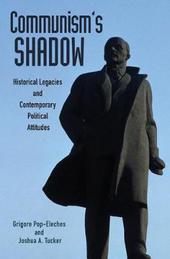
|
Communism's Shadow: Historical Legacies and Contemporary Political Attitudes
Hardback
Main Details
| Title |
Communism's Shadow: Historical Legacies and Contemporary Political Attitudes
|
| Authors and Contributors |
By (author) Grigore Pop-Eleches
|
|
By (author) Joshua Tucker
|
| Series | Princeton Studies in Political Behavior |
|---|
| Physical Properties |
| Format:Hardback | | Pages:344 | | Dimensions(mm): Height 235,Width 152 |
|
| ISBN/Barcode |
9780691175584
|
| Audience | | Tertiary Education (US: College) | | Professional & Vocational | |
|---|
| Illustrations |
25 line illus. 25 tables.
|
|
Publishing Details |
| Publisher |
Princeton University Press
|
| Imprint |
Princeton University Press
|
| Publication Date |
9 May 2017 |
| Publication Country |
United States
|
Description
It has long been assumed that the historical legacy of Soviet Communism would have an important effect on post-communist states. However, prior research has focused primarily on the institutional legacy of communism. Communism's Shadow instead turns the focus to the individuals who inhabit post-communist countries, presenting a rigorous assessment
Author Biography
Grigore Pop-Eleches is professor of politics and international affairs at the Woodrow Wilson School at Princeton University. He is the author of From Economic Crisis to Reform. Joshua A. Tucker is professor of politics and (by courtesy) Russian and Slavic studies and data science at New York University. He is the author of Regional Economic Voting: Russia, Poland, Hungary, Slovakia, and the Czech Republic, 1990-1999.
Reviews"[An] immensely ambitious, careful, and data-rich study. . . . Those trying to pin down with greater precision the legacy of communism now have a model to emulate."---Robert Legvold, Foreign Affairs "In this immensely ambitious, careful, and data-rich study, Pop-Eleches and Tucker do not merely explore the historical legacy of communism in eastern Europe; they also tackle the far more difficult problem of distinguishing its impact from that of other factors." * Foreign Affairs * "This book should be widely read by those interested in post-communist politics and societies, but it should also find a broader audience, as it sets a high standard in how to do research with public opinion datasets and wrestle with questions of the legacy effects of prior political systems."---Paul Kubicek, Slavic Review
|